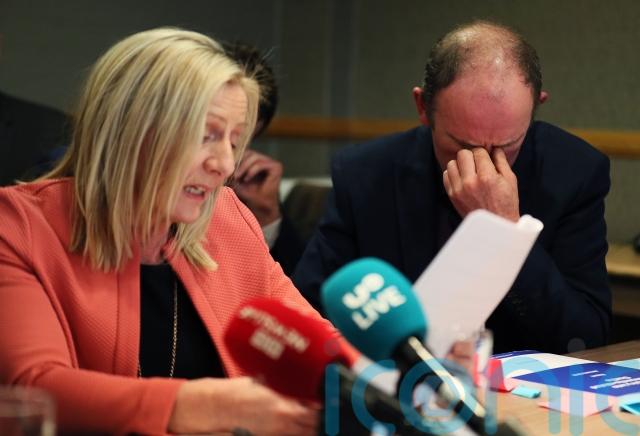
The family of a nine-year-old girl who died from hyponatraemia have faced a “long and painful journey”, a coroner has said.
A new inquest has opened at Londonderry Courthouse into the death of Raychel Ferguson at the Royal Belfast Hospital for Sick Children in June 2001.
She died a day after undergoing an appendix operation at Altnagelvin Hospital in Derry.
Opening the inquest, coroner Joe McCrisken said: “I want to formally welcome the Ferguson family here to Derry Courthouse.

“We all know that you have had a very long and painful journey up until this point.”
He said the role of the inquest will not be to attribute any blame for Raychel’s death.
Raychel, from Coshquin, Co Londonderry, was one of five children whose hospital treatment was examined in the long-running Hyponatraemia Inquiry.
Her death resulted from hyponatraemia brought on by fluid therapy which had not properly replaced her sodium levels.
Inquiry chairman Mr Justice O’Hara found in 2018 that Raychel’s death, and the deaths of Adam Strain and Claire Roberts, were the result of “negligent care”.
Following the inquiry, then-attorney general for Northern Ireland John Larkin directed that a new inquest be held.
Mr McCrisken said: “Primarily the attorney general directed a new inquest to correct the defects that had occurred at the time of the first inquest, due to a number of matters, a lack of disclosure of relevant evidence by the Western Trust, and also there was an emergence of new evidence and new material that had come about during the inquiry into hyponatremia-related deaths.”
The first witness to give evidence was surgeon Ragai Magar, a former senior house officer (SHO) at Altnagelvin Hospital, who carried out the appendectomy operation on Raychel in June 2001.

Michael Chambers, counsel for the coroner, asked Mr Makar if he was satisfied with the evidence he had given to the original inquest into Raychel’s death in 2003 and to the Hyponatraemia Inquiry. The doctor said he was.
Mr Makar then confirmed that it had been his responsibility to develop the plan for the administration of fluids to Raychel prior to her operation at Altnagelvin.
He told the inquest that he had prescribed Hartmann’s Solution to Raychel while she was in A&E but that when she was admitted to a ward this was changed to another fluid solution, known as Solution 18.
Mr Chambers asked him: “Did you think it was strange or unusual that you were asked to change the type of fluid or did you think little of it?”
Mr Makar said he did not believe it was strange or unusual, and that the use of Solution 18 had been protocol in the paediatric ward at Altnagelvin at the time.
Mr Makar said he had seen Raychel on the ward the morning following her operation, but did not examine her or check her notes because he had been told by a nurse that she had already been examined by a registrar.
However, the court was told that it had been another senior house officer who had examined Raychel, a more junior doctor than a registrar.
Mr Chambers asked: “If you didn’t plan to examine Raychel physically and you didn’t look at Raychel’s notes, what was the point of you going to see her the next day at all?”
Mr Makar said: “When I operate on any patient I see them in the morning or after the operation. I went to see the outcome of my operation, to be sure that everything is good and everything is well.
“Then in the morning, when I’m about to do all of that, I am told she was seen, that stopped me. For me to do what my colleagues have done before me is undermining them, it is not ethically acceptable.”
A barrister for the Ferguson family referred Mr Makar to the comments of Hyponatraemia Inquiry chairman Mr Justice O’Hara, who had criticised the fact that there had been no formalised handover between himself and the doctor who carried out the ward round the morning after Raychel’s operation.
The barrister said: “The chairman of the inquiry, he says your conduct was unacceptable.
“Whether you agree or disagree with me is neither here nor there. There is a judicial finding in an inquiry that your conduct was unacceptable. I am inviting your reaction to that?”
Mr Makar repeated that he had not obliged to examine the patient when she had already been checked by another doctor.
The court also heard from Dr Simon Haynes, a former consultant paediatric cardiothoracic anaesthetist, who had given evidence as an expert witness in the Hyponatraemia Inquiry.
He was asked about the practice in 2001 of using Solution 18 in the Altnagelvin paediatric ward as a standard way of administering fluid to children.
Dr Haynes said: “I think probably overall it’s fair to say it is not good practice, but historically this is the glucose electrolyte solution which was widely used for many years.
“Its use was based on a probably now outdated publication which looked more at the injury requirement of children rather than their fluid requirement.
“I can see how it has come to this, but I say its use should have been questioned, certainly as a routine use before 2001 in paediatric wards.”
The inquest, which is expected to last for two weeks, continues.
Subscribe or register today to discover more from DonegalLive.ie
Buy the e-paper of the Donegal Democrat, Donegal People's Press, Donegal Post and Inish Times here for instant access to Donegal's premier news titles.
Keep up with the latest news from Donegal with our daily newsletter featuring the most important stories of the day delivered to your inbox every evening at 5pm.